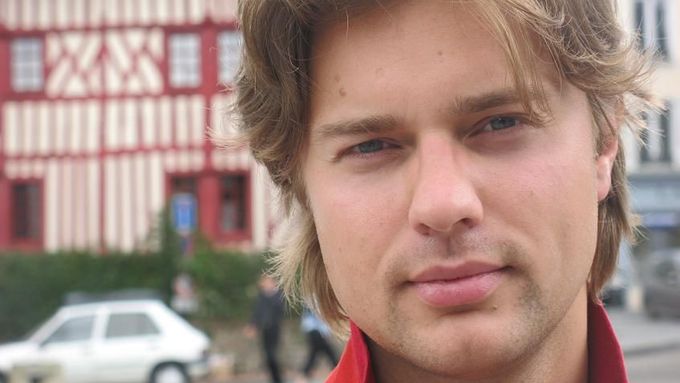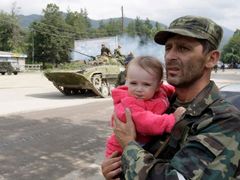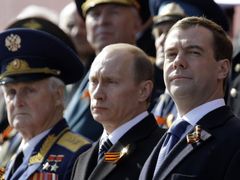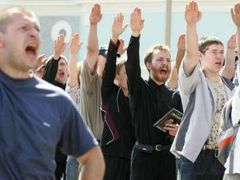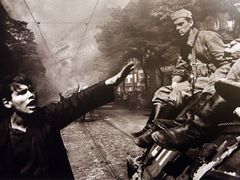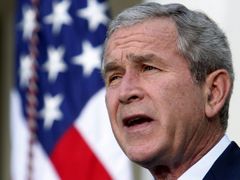Prague/London - The latest crisis in Caucasus has shown once again how big the gap is between Russia and the West when it comes to protecting the so-called national interests on either side on the divide.
Over the past few weeks, Russian officials have repeatedly asserted that Western governments use double standards when criticizing Russia for its actions, which - in essence - mirror the behavior of the US and its allies, be it in Iraq or in Kosovo.
And as the latest survey by Russian pollsters VTsIOM, published on Monday, shows - it is not just Russia's politicians, but also its general public who believe Western countries are hostile to Russia's interests.
Why do both sides of the new Cold War, as it has been called by some observers, fail to see eye to eye? And should the West really "start with the man in the mirror", when it wants to criticize others for not playing by the rules?
Thanks to a well-positioned Russian insider Pavel Andreev, who currently works as a deputy chief of London bureau of Russian news agency RIA-Novosti after a stint with Russian foreign ministry, readers of Aktuálně.cz got a unique opportunity earlier today to sound out a well-versed advocate of strong Russia, who has recently become one of the most sought-after interviewees of British and international media based in London (BBC, Al Jazeera, Daily Telegraph just to name a few) thanks to his ability to dispel misconceptions about newly resurgent Russia and to defend the Russian point of view:
(Reader who gave his name as) Expert: Why should we interfere in the affairs in Caucasus which is relatively far from central Europe?
Good question! The Caucasus has been a very vulnerable and unstable region over the whole of its history. Over the recent past it has gone from bad to worse with the breakup of the Soviet Union failing to define credible boundaries which would have satisfied the peoples of the Caucasus. This situation was further aggravated by the rampant nationalism. Now, almost two decades on these issues are still not resolved and any attempt to resolve them meets the stumbling block of the old rivalry. Now, the region is also very important geopolitically wise. Just like the Balkans in Europe - the region is capable of strangling Russia on one hand and Iran on the other. We shouldn't also forget that the region is a transit route for the oil supplies coming from the Caspian - this aggravates its importance for the countries which run these pipelines. Having said that, I believe, the way the outer world interfered in the region was counterproductive. Because of the abovementioned it is not the region to deal with by the means of force.
Read more: Czech govt plans intl donor conference for Georgia
Dave: How can one call the system which has now been put in place in Russia? It is not democracy and it will not be any time soon. The government controls the media, inconvenient journalists are being taken away. Some topics are taboo once again, as they were under the communist regime. Is this a rule of mafia and former KGB? How many people actually decide about Russia and its future course?
It's easy to place tags - but they normally do not reflect the whole complexity. Russian experience of "a democracy" in the 1990-s was very little of a welfare Western European state, but of a robber capitalism. Thousands were left with nothing while just few gained enormous wealth. The politics was a set of dirty tricks and failing reforms. Hence there was a need to restore the manageability of the country - both politically and economically wise. Now this trend is being supported by some 80% of the population - by all counts! Isn't that a democracy? Now, the situation is not perfect. The roll back on the anarchy of the 1990-s is visible. Control of the television is a good example. In the 1990-s it was owned by the rivalling oligarchs who used them in their quest for power. The programming reflected the interests of these groups, which were far from the people's. Now, today the television is much more reflective of what the people want than what it was 10 years ago. It is also true that the people are much less interested in politics at all, which is reflected in the TV programming. Having said that, those who want political debate find it extensivly elsewhere - in the newspapers, on the radio, in the Internet. One of the British top officials well aware of the situation in Russia recently mentioned that "Moscow is the liveliest place for political debates on Earth."
Karel: Good afternoon, I would like to know how dangerous, according to you, are the extremist groups in Russia and to what extent can their influence grow in the future, vis-a-vis the current attitude towards the West. Can we expect, for example, that some crazy skinhead will take power in Russia one day?
There are extremists of all sorts in Russia, just as anywhere else. The country has suffered enormously from the Islamic extremism with foreign roots during the conflict in Chechnya. Now the situation is more under control. There is hardly any constituency for extremists to gain any real political weight. However, the actions of some Western countries towards Russia boost radical nationalism in the country, which is not healthy, but far from being a serious threat.
Read more: Czech senator returns to war reporting in Georgia
Pavel Táborský: Good afternoon. How do you defend the fact that Russian army remains in the Georgian territory despite the previous agreements and promises of withdrawal?
The points of the Medvedev-Sarkozy plan quite vaguely provide for the additional security measures to be undertaken to prevent a new Georgian assault on the enclaves. Let's not forget, that the capital of South Ossetia - Tskhinvali - was shelled by the Georgian Grad rockets from near Gori and elsewhere on the territory of Georgia proper - the territory which Russia now keeps under control. The place is actually so tiny, that with the firing range of the modern weapons it is really hard to provide for the full security in the region. The best solution for it would be to have the international monitors in Georgia proper on the border with South Ossetia and Abkhazia as soon as possible.
Saša: Pavel Andreev, what do you say to the fact Russia was voluntarily handing over passports to South Ossetians years ago who were happy to receive them, as they could go to Russia to work. Isn't there something else that Russia has been following by doing this? No country in the world would ever give passports for free…
After the wars of the early 1990-s the economic situation in South Ossetia and Abkhazia was dreadful. There has been virtually no economy whatsoever. It was obvious that the labour migrants from the enclaves had to get the passports to travel. And for some reason they didn't want the Georgian passports or to travel to Georgia to work. On the contrary, some estimates say that around 20 thousand people from South Ossetia only have been working in Russia while living in South Ossetia. Russia historically has been paternising the Caucasus as it has been important for Russia to keep the region safe and stable. One of the things was to give passports.
Pepa: To what extent are the Russia media censored? Is it similar to the Czech media that bring mostly foreign news in line with the American propaganda and most of the Czech journalists are subject to self-censorship. Or do you have a complete censorhip in the country?
As I mentioned above the censorship is not the word. There is quite a subtle system of managing the media and this by far ends on the federal television channels. Otherwise there is a full variety of opinions available and open for debate. Having said that there is a growing sense of accountability of the journalists for what they write, rather than a complete absense of restraint - apart from the owner's needs - we saw in the 1990-s. I think that is a positive development to mature media, when you have to check facts before you air them.
BK: Good afternoon. How can the United Russia party enjoy so much support among public when it is based solely on a one-man cult, that is of Vladimir Vladimirovich Putin but the party has no "program" how to communicate with the West. Thanks for your reply.
The United Russia party cleverly moulded itself to the trend the majority of the population support - essentially, we want to build our country ourselves.
Maja: Russia says it was just protecting its own citizens in South Ossetia. But what about its own citizens in Russia and Chechnya? Wouldn´t they deserve more "care" as well? To be protected against homophobic Nazis, for instance?
The problem with the extremists exists anywhere in the world. We need to deal with it.
Marek Beneš: Good afternoon. What will happen if Ukraine joins NATO? Can we expect splitting Ukraine in Western and Eastern parts? Have you heard of the anti-Russia hystery that hit the Czech media and eventually President Klaus?
It is obviously up to NATO and the Ukrainian people to decide if the country is to join the Alliance. I hope the NATO officials will consider the Ukrainian people's opinion. Because as yet, two thirds are against the move. If the decision is to be taken democratically I can't see why the country will be split in two. As far as I understand the Czech media are following the trend of the Western media generally. Well, it is mostly based on ill-information and stereotypes. Unfortunately, once again Russia failed to explain itself well enough, but then the West didn't really want to listen. Everything the Saakashvili PR team was putting out fell very neatly into the narrative so why bother with getting to the nitty-gritty aspects of the problems. It's hard to find time for it in the 24/7 news rotation.
Pavel Táborský: I am no fan of the US radar base on Czech soil. But can you tell me why it should be a threat to Russia when it has so many rockets itself that the West would not be able to defend itself against possible Russia´s attack?
The currently proposed system apparently doesn't pose a threat to the Russian nuclear deterrent. Having said that, what worries Russia is that the Washington officials openly state that the system would be upgraded and enhanced. Russia is worried against the further approach of the alien military infrastructure to the borders. The radar will not be on its own. It will have soldiers based there. Today there are 250 of them, the year after 25 thousand. It is the princip the Russia is worried about. Too many times Russia was promised that there would be no further advance of the NATO/US military and then we had expansion of NATO, its bases in Romania and Bulgaria, now Poland and the Czech Republic.
Read more: Defense Ministry objects to Russia´s sharp rhetoric
Bolek: Is it possible to make an estimate to what extent KGB influences the Russian politics? How are the oil giants interlinked with the country´s course of politics?
I think the KGB influence is well overstated. It's a convinient cold war time bogey man for the Western audience. There is a wide constituency for the current political course, of which the siloviki fraction - former security and defence services officials - play a part. Furthermore, there is a whole system of check and balances of which Vladimir Putin seem to be the key as yet. The country needed to be sorted out, so a strong hand was essential at some aspects.
Míra: What do you think of the occupation of Czechoslovakia in the years 1968-91 by the Soviet armies?
I think it was inevitable, but unfortunate in that geopolitical situation of the cold war layout. Czechoslovakia was an important brick of the Warsaw pact. If it left, the balance of power and of spheres of influence would have been compromised. Reflecting on the situation then you can see how unhealthy is the rhetoric about the new Cold War aired by some politicians now. The example of the Czech Republic being now good neighbours with the countries which participated in the invasion 1968 should be the one to follow. But unfortunately Russia seems to be denied the right to be a part of it. That is an unfortunate outlook of the ongoing attempts of the USA to isolate and antagonize Russia. It is actually spreading its sphere of influence at the expense of Russia's relations with its neighbours.
Read more:
Josef Koudelka forgives Warsaw Pact troops for 1968
Ex-Soviet dissident: We wanted our Prague Spring too
Pavel: Pavel Viktorovich, please excuse the blindness of some of the people posing questins here. As a Czech I feel ashamed of them. Not everybody has forgotten about how many brave Russians have died for us in the war. I wish you and your country all the best.
Thank you very much. I strongly believe that it is not Russia's goal to get at loggerheads with Europe or in fact any other part of the world. There needs to be mutual respect and the rule of international law reestablished in the world which would prevent further tensions and bancrupt any rhetoric.
Vladimir: Would Russia act in a different way if the West listened to Russia´s views on Kosovo?
In South Ossetia Russia acted the way it did because it didn't have any other choice. It had a mandate to secure the peace and it had to defend its citizens. Having said that, Russia time and again warned about the consequences of the unilateral independence of Kosovo on the Caucasus and other regions of the world. So in terms of whether the Kosovo precedent boosted the ambitions of the separatists in Abkhazia and South Ossetia and sparked the tensions - of course it did.
Read more: Govt recognized independent Kosovo. Not unanimously
J.: Do you think the olny solution is to recognize independence of S. Ossetia and Abkhazia?
I think the Georgian military adventure didn't leave any room forTbilisi to negotiate the enclaves future within Georgia. The population of both territories have more that once voted for their independence, so if you follow by the book - then the independence would be the only sensible outcome.
HONZA: I agree with the parallel drawn bt Russia and US regarding their intervention in autonomous regions. The only reasons by these two is the US always gets international community´s support. Why did not Russia try to get it? Thus they are viewed as an aggressor.
The US hardly had "the international community" support for the war in Iraq for instance. Let's not forget that NATO countries is not the whole world. Similarly the independence of Kosovo hasn't enjoyed the recognition of the majority of the international community. Having said that, there are several reasons why the US manages to make the impression of "the international support". Firstly, the most powerful international media are of the US and the UK - the latter visibly lacking its own opinion on any significant issue, simply following the footsteps of Washington. Secondly, the American and British politicians are also much more articulate and media friendly, with English being the main media language of the times. Thirdly, they don't really feel ashamed to lie (or as they put it - to spin) on air - remember Tony Blair´s claim, that it would have taken Saddam Hussein 30 minutes to send his weapons of Mass Destruction to Europe. Now where were these WMD?
Peca: Hi. Do you think the double standard approach is actually caused by the West´s fear of Russia. Shouldn't the West just recognize Russia as an equal partner?
The US policy towards Russia is actually to neutralize it as a potential competitor for its authority in the world. US just doesn't want anybody to come in its way, whichever way comes up to the minds of those in Washington. before the Munich speech Russia repeatedly had been trying to establish a cooperation with the West. Vladimir Putin - who is usually blamed in the Western media for bringing up tensions between Russia and the West - gambled greatly in the 2000-2001 when after the bombardements of Yugoslavia, he decided to roll back on the radar in Cuba, the naval base in Vietnam, helping the allied forces in Afghanistan. He thought these gestures of good will may be appreciated in Washington.
But in exchange he received the US withdrawal from the cornerstone nuclear balance Anti-Ballistic Missile Treaty, a new expansion of NATO and an outright demonstration of the US arrogant approach to the international law in the form of the war in Iraq. Ever since the end of the Cold War the US never gave up its Cold-War thinking and therefore never planned to consider Russia an equal partner.
